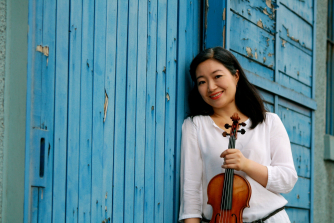Details
St Andrew's Church
Church Street
Cobham
Surrey
KT11 3EJ
England
Programme
Ludwig van Beethoven – String Quartet in F major, Op.18 no.1
Benjamin Britten – 3 Divertimenti
~ Interval ~
Felix Mendelssohn – String Quartet no.3 in D major, Op.44 no.1
Performers
Arisa Fujita – violin / director
Elvina Auh – violin
Connie Pharoah – viola
Silvestrs Kalnins – cello
Other concerts in this Series (+)
Programme Note
BEETHOVEN: The suggestion for a quartet was first made to Beethoven in 1795 by Count Apponyi, but it was to be another three years before Beethoven took up the challenge. The F major quartet was the second of the set to be composed, after the D major (Op. 18 No. 3), but was placed first in the published set because it was the most impressive in terms of size and expressive range. It is the only one with a slow movement in a minor key (D minor) - a tragic operatic scene on the grandest scale apparently inspired by the tomb scene from Romeo and Juliet.
BRITTEN: Benjamin Britten’s penchant for composing resulted in over 100 numbered compositions before the age of eighteen. The Three Divertimenti for String Quartet were written in 1933 when he was in his early twenties, and revised quite extensively in 1936. The work comprises a set of three individual character pieces meant as ‘pleasing entertainment’ and was finally named 'Three divertimenti - go play, boy, play' by Britten. At one stage the suite was associated with Erich Kästner's film ‘Emil und die Detektive’ (1931).
MENDELSSOHN: Mendelssohn’s ten visits to Britain, during which many of his major works were premiered, formed an important part of his adult career, although his somewhat conservative musical tastes set him apart from some of his more adventurous musical contemporaries. He wrote six numbered string quartets which were all published during his lifetime, and he wrote to a friend 'I have just finished my Quartet in D. I like it very much. I hope it may please you as well. I rather think it will, since it is more spirited and seems to me likely to be more grateful to the players than the others.'
We expect this concert will be popular! Come early to reserve your seat! Refreshments available before the performance and during the interval.

 Your events at Classical Events
Your events at Classical Events

